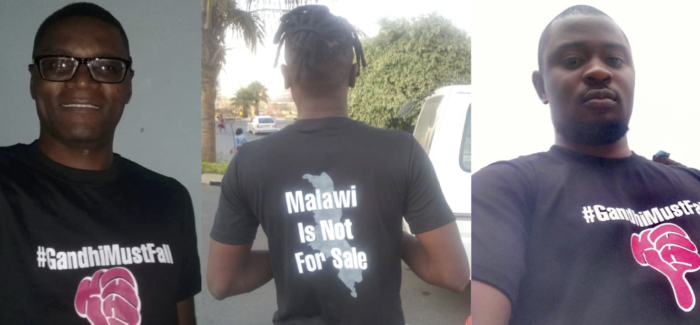Activists Secure Injunction Blocking Gandhi Statue in Malawi
Admin | On 30, Oct 2018
“India wants to be an imperial power over Malawi,” say activists
BLANTYRE, Malawi: Oct. 30, 2018 — Just three weeks after launching an online petition calling on Malawi’s second-largest city, Blantyre, to “Stop Erecting Racist Mahatma Gandhi’s Statue,” activists in the southern central African country have secured an injunction blocking installation of the planned statue.
“We will fight the construction of the statue in court,” said Pemphero Mphande after the injunction was obtained. “We don’t want this statue. Gandhi has no place in our history. Gandhi was a racist who labeled Africans as savages.”
The High Court of Blantyre has announced a hearing date of November 12. The statue was expected to be unveiled on Nov. 4 during a state visit by Indian Vice President Venkaiah Naidu. According to a press statement by India’s Ministry of External Affairs (MEA), “There have been 26 outgoing visits to Africa at the level of President, Vice President and Prime Minister in the last four years.” The MEA added, “Africa has been accorded the top priority in India’s Foreign Policy.”
Activists in Malawi, however, interpret India’s foreign policy approach to their country as imperialistic. Speaking about the Gandhi statue, Wonderful Mkhutche says, “The issue about Gandhi is coming to Malawi right now simply because his country of origin, India, wants to be an imperial power over Malawi. India knows the desperation we have and is using that to spread its unwelcome influence in Malawi. As Malawians, we will not accept that.”
Mkhutche is one of several activists who launched the original change.org petition against the statue, which has garnered nearly 3,700 signatures. “Gandhi does not have any point of contact with Malawi, both as a country and as a nation,” he explains. “Our fight for independence started in 1915. It was the sacrifice of patriots that made it possible. We have bled for this in many different ways, and there was no time Gandhi was there for us. Gandhi was not an ally of Africans when he was in South Africa. His ideals were against the black people in South Africa. He called them Kaffirs. There is no record that Gandhi went away from those ideas. It is unfortunate to have such a man venerated in Malawi with a statue.”
“Reevaluation of Mohandas Gandhi and the negative impact he had during his 21 years in South Africa has increasingly outraged Africans throughout the continent,” remarks Pieter Friedrich, an analyst of South Asian affairs. “For decades, India has used Gandhi as a tool to impose its foreign policy goals, especially by paying for installation of his statues all around the globe. It’s called gandhiplomacy, but Africans who perceive that his actions in South Africa laid the foundations for apartheid are seeing through what they believe is actually propagandhi.”
In 2016, controversy erupted at the University of Ghana after then Indian President Pranab Mukherjee unveiled a statue of Gandhi on the campus. Faculty members launched a change.org petition demanding that “Gandhi’s Statue at the University Of Ghana Must Come Down.” They argued, “Gandhi was uncharitable in his attitude towards the black race.” Malawians used even stronger language, arguing that Gandhi made statements “showing nothing but contempt for the black African race.”
“Just like Gandhi treated Africans as inferior and worked to build a three-tiered system of segregation in South Africa a few decades before apartheid, so also India is bullying Africans into accepting inferior status in exchange for aid,” comments Arvin Valmuci, a spokesperson for Organization for Minorities of India (OFMI). “We stand in solidarity with our brothers and sisters in Malawi as they resist this insult to their dignity and affront to their sovereignty.”

